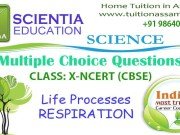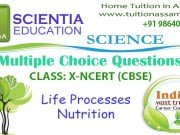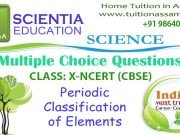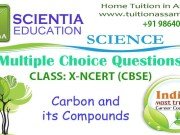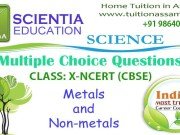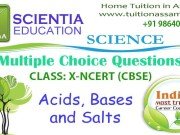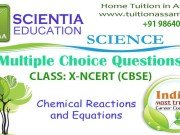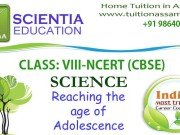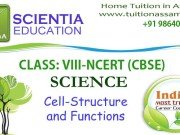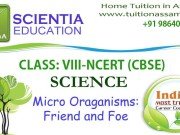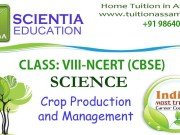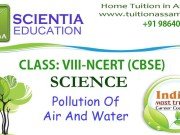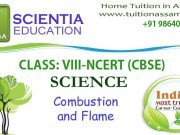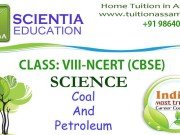CLASS: X :: How do Organisms Reproduce
CLASS: X NCERT (CBSE)
BIOLOGY
How do Organisms Reproduce
Question 1: The male hormone testesterone is produced by _________.
1. Leydig cells
2. Seminiferous tubules
3. Epididymis
4. Vas deferens
Answer: 1
Question...
CLASS: X :: Control and Coordination
CLASS: X NCERT (CBSE)
BIOLOGY
Control and Coordination
Question (1): The cells in our body that can be over a foot long are _____.
1. muscle cells
2. nerve...
CLASS: X :: Life Processes Transportation
CLASS: X NCERT (CBSE)
BIOLOGY
Life Processes Transportation
Question (1): The colour of blood in the veins is _______________.
1. bright red
2. dark red
3. blue
4. black
Ans: 2
Question (2):...
CLASS: X :: Life Processes RESPIRATION
CLASS: X NCERT (CBSE)
BIOLOGY
Life Processes RESPIRATION
Question 1: The most common substrate of respiration is _________.
1. fats
2. amino acids
3. glucose
4. sucrose
Answer: 3
Question 2: During respiration,...
CLASS: X :: Life Processes Nutrition
CLASS: X NCERT (CBSE)
BIOLOGY
Life Processes Nutrition
Question (1): Nutrition includes the study of _____________.
1. the organism's food
2. process of digestion
3. the way an organism obtains...
CLASS: X :: Life Processes Excretion
CLASS: X NCERT (CBSE)
BIOLOGY
Life Processes Excretion
Question (1): Loop of Henle is concerned with:
1. excretory system
2. reproductive system
3. nervous system
4. muscular system
Ans: 1
Question (2): Urea...
CLASS: X :: Periodic Classification of Elements
CLASS: X NCERT (CBSE)
Chemistry
Periodic Classification of Elements
Question 1: The properties of an element in the periodic table depends on its, ________.
1. atomic size
2. atomic...
CLASS: X :: Carbon and its Compounds
CLASS: X NCERT (CBSE)
Chemistry
Carbon and its Compounds
Question (1): Which of the following statements is not applicable to cabon...
CLASS: X :: Metals and Non-metals
CLASS: X NCERT (CBSE)
SCIENCE: Chemistry
Metals and Non-metals
Question 1: Of these, the most ductile metal is ___________.
1. Al
2. Au
3. Cu
4. Ag
Answer: 2
Question 2: Of these,...
CLASS: X :: Acids, Bases and Salts
CLASS: X NCERT (CBSE)
SCIENCE
Acids, Bases and Salts
Question (1): The characteristic properties of an acid is
due to the presence of ___________.
1. hydride ions
2. hydroxyl ions
3....
CLASS: X :: Chemical Reactions and Equations
CLASS: X NCERT (CBSE)
SCIENCE
Chemical Reactions and Equations
Multiple Choice Questions
Question 1: Which among the following is not a physical change?
1. Melting of solids to liquids
2....
CLASS: VIII :: Reaching the age of Adolescence
CLASS: VIII NCERT (CBSE)
Biology
Reaching the age of Adolescence
SUMMARY
Changes During Puberty
After the age of ten years, an individual becomes anadolescent, and...
CLASS: VIII :: Reproduction in Animals
CLASS: VIII NCERT (CBSE)
Biology
Reproduction in Animals
SUMMARY
Sexual Reproduction in Animals
Amoeba and bacteria adopt the asexual mode of reproduction.Reproductive organs in humans producegametes - eggs and...
CLASS: VIII :: Cell-Structure and Functions
CLASS: VIII NCERT (CBSE)
Biology
Cell-Structure and Functions
SUMMARY
Introduction to Cells
With the help of a microscope, an English scientist,Robert Hooke, first discovered the existence of cells in...
CLASS: VIII :: Conservation of Plants and Animals
CLASS: VIII NCERT (CBSE)
Biology
Conservation of Plants and Animals
SUMMARY
Deforestation and Reforestation
Deforestation is the clearing of forests to use the land for cultivation, building houses and...
CLASS: VIII :: Micro Oraganisms: Friend and Foe
CLASS: VIII NCERT (CBSE)
Biology
Micro Oraganisms: Friend and Foe
SUMMARY
World of Micro Organisms
It'll be exciting to learn about microbes because we humans have microbes in our...
CLASS: VIII :: Crop Production and Management
CLASS: VIII NCERT (CBSE)
Biology
Crop Production and Management
SUMMARY
Agriculture
The term crop is used to describe plants of the same kind that are grown and cultivated at...
CLASS: VIII :: Pollution Of Air And Water
CLASS: VIII NCERT (CBSE)
Chemistry
Pollution Of Air And Water
SUMMARY
Air Pollution
Substances that cause harmful changes in the air are called pollutants. Air pollution is caused due...
CLASS: VIII :: Combustion And Flame
CLASS: VIII NCERT (CBSE)
Chemistry
Combustion And Flame
SUMMARY
Combustion
The chemical process in which a substance reacts withoxygen to give off heat is called combustion.
A substance that undergoes...
CLASS: VIII :: Coal And Petroleum
CLASS: VIII NCERT (CBSE)
Chemistry
Coal And Petroleum
SUMMARY
Natural Resources
Resources supplied by nature are called natural resources. The sun, air,...







